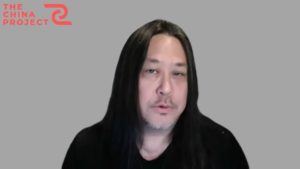
US lawmakers have started debate on a law that would ban the successful TikTok app. Political analyst Kaiser Kuo dismisses the effort as misguided at best, he writes in the ChinaFile. “In a sense, the threat of TikTok is real: In this crisis of confidence, and in a state of moral panic that we’ll look back on red-faced a decade out, TikTok is causing us to inflict grievous self-harm.”
Kaiser Kuo:
The bill that got through Congress on Wednesday to effectively ban TikTok—let’s not pretend either that this bill isn’t specifically about TikTok, or that a forced divestiture isn’t tantamount to a ban—is the latest example of a classic pattern of American behavior: In a panicked attempt to preserve the American way of life, we undermine that very way of life. This time, we seem to be falling over one another to sacrifice our openness, a cornerstone of American strength, out of exaggerated fear that a social media app owned by a Chinese company could be our undoing. As usual, this whole episode says much more about us than it does about China. We have a terrible track record of making bad decisions while in the throes of a moral panic, from Prohibition to the Patriot Act. A closer analogy can be found in the Trump administration’s moves to restrict Chinese STEM students and researchers from coming and working in the U.S., and the subsequent China Initiative. Out of a fear that Chinese industrial espionage would confer an advantage on Beijing, we somehow decided that we were better off if all that prodigious Chinese STEM talent went back to China or just stayed there.
If we accept that we ought to take preemptive action against threats to national security, even if they are only latent and potential, any actions should address those potential threats in good faith. In this case, the threats are data harvested by social media falling into the hands of the Chinese, and social media being used by China to advance a hostile agenda. The bill now making its way to the Senate does not address either of these threats. Instead, it takes aim only at one relatively minor potential vector. Not only is the preponderance of valuable data on TikTok out in the open—the content itself, not the metadata—and would be there just the same irrespective of who owned the company, but Beijing can easily either buy valuable data from brokers, vacuum it up from other social media properties, or just acquire it the old fashioned way, through hacking.
That the motive behind this bill is not, in fact, data security is driven home by the refusal of legislators to accept ByteDance’s own proposal, Project Texas, which was devised in consultation with the Austin-based tech company Oracle and The Committee on Foreign Investment in the United States (CFIUS) and would see data localized and housed entirely on servers controlled by Oracle with oversight entirely by U.S. citizens vetted and approved by Oracle. Project Texas would make TikTok the most locked-down, secure social media property in the U.S., if not in the world. The notion that even under that plan, Beijing would still decide to squeeze ByteDance just to acquire data it could obtain far more easily, and in ways that wouldn’t seriously imperil the only Chinese social media company to have enjoyed any global success, is just risible.
And influence? If TikTok is a potent vector for Chinese propagandists, one has to ask: How’s that working out for you, Beijing? Across its years of popularity, American attitudes toward China have plummeted, not improved. If we’re looking for causation, it is clear enough that, if anything, it’s our low national opinion of China driving D.C.’s animus toward TikTok. In a sense, the threat of TikTok is real: In this crisis of confidence, and in a state of moral panic that we’ll look back on red-faced a decade out, TikTok is causing us to inflict grievous self-harm.
More viewpoints at the ChinaFile.
Kaiser Kuo is a speaker at the China Speakers Bureau. Do you need him at your meeting or conference? Do get in touch or fill in our speakers’ request form.
Are you looking for more political experts at the China Speakers Bureau? Do check out this list.
No comments:
Post a Comment